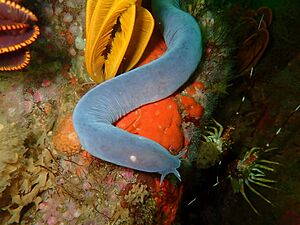Sixgill hagfish facts for kids
Quick facts for kids Sixgill hagfish |
|
|---|---|
 |
|
| Off False Bay, South Africa | |
| Conservation status | |
| Scientific classification |
|
| Kingdom: | Animalia |
| Phylum: | Chordata |
| Superclass: | Agnatha |
| Class: | Myxini |
| Order: | Myxiniformes |
| Family: | Myxinidae |
| Genus: | Eptatretus |
| Species: |
E. hexatrema
|
| Binomial name | |
| Eptatretus hexatrema (Müller, 1836)
|
|
| Script error: The function "autoWithCaption" does not exist. | |
| Synonyms | |
|
|
Script error: No such module "Check for conflicting parameters".
The sixgill hagfish, also known as Eptatretus hexatrema or the snotslang, is a fascinating creature that lives in the ocean. It is a type of fish belonging to the hagfish family, called Myxinidae. This unique animal is found in the South Atlantic Ocean and the southwestern Indian Ocean.
Contents
Where Sixgill Hagfish Live
The sixgill hagfish lives in the southeastern part of the Atlantic Ocean. You can find them from Walvis Bay in Namibia all the way to Durban in South Africa.
What Sixgill Hagfish Look Like
The sixgill hagfish can grow up to 80 centimeters (about 31 inches) long. Its body is long and thin, like an eel. It has a dark, slaty grey color.
Special Features of the Sixgill Hagfish
This hagfish gets its name from having six gill openings on its body, which it uses to breathe underwater. Around its mouth, it has six feelers called barbels that help it find food.
Unlike most fish, the sixgill hagfish does not have paired fins, like the fins on the sides of a fish that help it steer. It also doesn't have jaws in its mouth. Instead, it has two rows of tough, horny teeth that can stick out.
Another cool feature is the two rows of "slime pores" under its body. These pores can release a huge amount of sticky slime when the hagfish feels threatened. This slime can clog the gills of predators, helping the hagfish escape!
Sixgill Hagfish Habitat and Behavior
Sixgill hagfish are "demersal" animals, meaning they live near the bottom of the ocean. They usually stay in one area and do not migrate, which means they don't travel long distances.
They prefer to burrow into soft, muddy bottoms. You can find them in waters from 10 to 400 meters deep, but they are most often seen between 10 and 45 meters deep.
What Sixgill Hagfish Eat
These hagfish are "scavengers." This means they mostly eat dead or injured fish that have sunk to the ocean floor. They play an important role in cleaning up the ocean.
Life Cycle and Reproduction
When sixgill hagfish lay eggs, the eggs are oval-shaped. They are about 30 millimeters (just over an inch) long and 12 millimeters (about half an inch) wide. Each egg case has special anchor filaments at both ends, which likely help them attach to the seabed.
Conservation Status
The sixgill hagfish is currently listed as "Least Concern" by conservation groups. This means that its population is stable, and it is not considered to be at risk of disappearing.
Why the Sixgill Hagfish is Called That
The scientific name Eptatretus comes from Greek words: "epta" means seven, and "tretos" means with holes. This refers to the number of gill openings in some hagfish species. The "hexatrema" part of its name likely refers to its six gill openings.
It is commonly known as the "sixgill hagfish" because of its six gills. Its other common name, "snotslang," comes from its ability to produce a lot of slime!
 | Emma Amos |
 | Edward Mitchell Bannister |
 | Larry D. Alexander |
 | Ernie Barnes |


